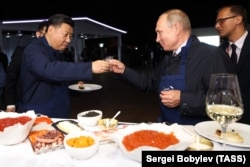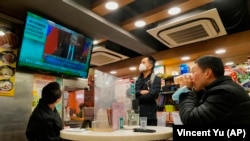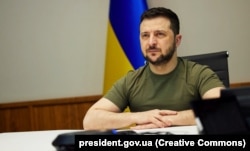China’s Messaging On The Ukraine War Is Evolving, But In Which Way?
China has emerged as a potent outlet for Kremlin disinformation and propaganda for its February invasion of Ukraine, with Beijing officials and state media echoing the Kremlin’s justification for the war and often parroting false claims about events while ignoring commentary from Kyiv.
But Chinese state news agency Xinhua made the rare move on April 30 of giving Ukrainian Foreign Minister Dmytro Kuleba uncensored space to criticize the Kremlin. It also let him push for China to play a larger role in bringing Russia to the negotiating table and warn about the global consequences for Beijing in sticking with Moscow amid mounting international pressure and fallout.
“Russia is jeopardizing Chinese leaders’ Belt and Road Initiative,” Kuleba said, referring to Chinese President Xi Jinping’s signature foreign policy project. “This war is not in line with China’s interests. The global food crisis and economic problems…will pose a serious threat to the Chinese economy.”
The interview with Kuleba appeared shortly after a similar one the same day with Russian Foreign Minister Sergei Lavrov in which he pushed familiar Russian talking points about Ukraine being run by far-right nationalists and engaging in a Western-led proxy war with Moscow.
But while the contrasting interviews do not suggest an imminent change in Chinese policy, publishing Kuleba’s words verbatim — where he painted Russia as a threat to global stability and an unreliable ally for Beijing — marks an evolving line for Chinese propaganda amid the Ukraine crisis that is slowly incorporating more Ukrainian viewpoints while taking aim at the United States as the instigator of the conflict.
Bolstered by nearly a decade of cooperation in international media — including pledges signed by Xi and Russian President Vladimir Putin dating back to 2013 — and a deepening partnership against the West that both leaders characterized as a “no-limits” friendship in February, Chinese state-controlled outlets have helped spread Moscow’s narrative of the war to their massive audiences at home and abroad.
China’s tightly controlled media do not refer to the war as a Russian invasion and have instead used the Kremlin terminology, calling it a “special military operation.” Elsewhere, Chinese channels have pushed a Russian false claim that the United States runs dangerous bioweapons labs in Ukraine, have asserted that the bombing of a children’s hospital in Mariupol and the extrajudicial killing of civilians in the town of Bucha were hoaxes, and have suggested that Ukrainian President Volodymyr Zelenskiy was being controlled by U.S. billionaire George Soros.
“The speed with which the topic was seeded into the Chinese information environment shows the ease with which [Chinese and Russian] state-media cooperation can sow disinformation by citing each other as sources and expanding on each other’s angles,” Jerry Yu, an analyst at Doublethink Lab, a Taiwan-based organization that tracks Chinese disinformation and propaganda, wrote in a recent report.
An Evolving Line
China has one of the world’s most restrictive media environments and is mostly made up of state-backed outlets, with its Internet and social media platforms monitored by a vast censorship apparatus that removes any information deemed sensitive.
Since Russia’s February 24 invasion, China has walked a careful diplomatic line and looked to distance itself from Moscow’s war while avoiding any criticism of its actions.
While experts say Beijing is highly unlikely to drop Moscow as a partner, they acknowledge that Russia’s invasion of Ukraine and the economic and political blowback it has caused does not sit well with China and that Beijing may be looking to signal growing displeasure as the war shows no signs of ending.
But any speculation about the resiliency of Beijing’s support for Moscow appears misplaced when looking at the pro-Russian slant within Chinese reports.
Chinese state media still continue to lend their platforms to amplify Russian propaganda, often citing Kremlin officials and Russian-controlled media as their news sources, according to the China Digital Times, a U.S.-based group that tracks Chinese online censorship and discussion, which also notes that outlets receive regular state directives that guide their coverage.
Beijing has stayed consistent since early in the war with its line that NATO — and the United States in particular — are to blame for provoking Russia into attacking its neighbor.
But the nature of coverage has shifted during the 10 weeks of the conflict.
Some Chinese reports and social media posts have covered news much like that of Western media, pointing to the growing humanitarian cost of the war and efforts by international bodies like the United Nations to provide aid.
But this line has been adopted slowly. The state broadcaster CCTV, for example, didn’t mention civilian casualties from Russian attacks until the third week of the war.
While criticism of Zelenskiy has been minimal, so, too, has coverage of the Ukrainian leader.
His regular speeches to Western parliaments and nightly addresses to his country have received scant coverage with state-run media instead only quoting Zelenskiy when he has criticized Western partners over the lack of energy sanctions or inconsistent military support.
Chinese media also began to focus more coverage on warnings about neo-Nazis in Ukraine, which has been a dominant part of the Kremlin’s justification for invading.
According to a database created by the Alliance for Securing Democracy, a group that tracks Chinese and Russian disinformation, Chinese diplomats and state media have tweeted about neo-Nazis more times since the war began than they did in the six months before.
In one notable example, Li Yang, an official with China’s Foreign Affairs Ministry, tweeted a doctored photo in early April that alleged to show a group of neo-Nazis holding a banner with a swastika on it next to Ukrainian and American flags.
“Surprisingly, the [the United States] stands with the neo-Nazis!” Yang wrote above the image, which had a swastika flag inserted in place of a U.S. one that was in the original photo.
That focus on the United States amid the war in Ukraine has been a feature of Chinese coverage since the beginning, but also appears to be becoming a more dominant thread.
Amid reports of atrocities by Russian soldiers in the Ukrainian village of Bucha, the Global Times, a state-run nationalist tabloid, looked to absolve Russia of responsibility for the killings and instead putt the blame on Washington.
“It is regrettable that after the exposure of the ‘Bucha incident,’ the [United States], the initiator of the Ukraine crisis, has not shown any signs of urging peace and promoting talks, but is ready to exacerbate the Russia-Ukraine tensions,” the editorial said.
Beyond The War Of Words
While the full extent of any direct collusion between China and Russia on propaganda over the Ukraine war is unclear, Beijing’s rhetorical backing of Moscow has left it facing pressure from the European Union and the United States, its two-largest trading partners.
U.S. Deputy Secretary of State Wendy Sherman accused Chinese state media of “parroting the Kremlin’s disinformation” and spreading conspiracy theories in late April while the EU warned Xi and other high-ranking Chinese officials during a late March summit that its support for Russia could jeopardize economic ties with Brussels.
China so far shows no signs of circumventing Western sanctions or rushing in to fill the void left by the departure of Western companies from Russia and U.S. officials told Reuters recently they were “relieved” that Chinese economic and military support has not materialized amid the war.
Writing in the U.S. journal Foreign Affairs on May 2, Yan Xuetong, dean of the Institute of International Relations at Beijing’s elite Tsinghua University, wrote that Moscow’s war has created a “strategic predicament” for China due to heightened international tensions and the disruption of billions of dollars of Chinese trade, but that Beijing is still likely to remain in Russia’s camp.
“China blames the United States for provoking Russia with its support for NATO expansion and worries that Washington will seek to prolong the conflict in Ukraine in order to bog down Russia,” he wrote. “Beijing sees little to gain from joining the international chorus condemning Moscow.
This article has been archived for your research. The original version from Radio Free Europe / Radio Liberty can be found here.




